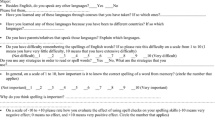Abstract
Spelling pronunciations are hypothesized to be helpful in building up relatively stable phonologically underpinned orthographic representations, particularly for learning words with irregular phoneme-grapheme correspondences. In a four-week computer-based training, the efficacy of spelling pronunciations and previewing the spelling patterns on learning to spell loan words in Dutch, originating from French and English, was examined in skilled and less skilled spellers with varying ages. Reading skills were taken into account. Overall, compared to normal pronunciation, spelling pronunciation facilitated the learning of the correct spelling of irregular words, but it appeared to be no more effective than previewing. Differences between training conditions appeared to fade with older spellers. Less skilled young spellers seemed to profit more from visual examination of the word as compared to practice with spelling pronunciations. The findings appear to indicate that spelling pronunciation and allowing a preview can both be effective ways to learn correct spellings of orthographically unpredictable words, irrespective of age or spelling ability.
Similar content being viewed by others
References
Bosman, A., van Hell, H., & Verhoeven, L. (2005). The spelling of strange words and regularized reading. Manuscript submitted.
Brus, B. T., & Voeten, M. J. M. (1972). Eén-Minuut-Test [One-Minute-Test]. Nijmegen: Berkhout.
Burnage, G. (1990). CELEX—A guide for users. Nijmegen: Centre for Lexical Information, University of Nijmegen, The Netherlands.
Cito (2003). Leerling volg systeem: Schaal vorderingen in spellingvaardigheid [Pupil observing system: Scales for spelling ability 1]. Arnhem: Cito.
Conrad, N. J. (2005). Examining the relation between reading and spelling: A training study. Paper presented at the 12th annual meeting of the Society for the Scientific Study of Reading, Toronto, Canada.
Drake, D. A., & Ehri, L. C. (1984). Spelling acquisition: Effects of pronouncing words on memory for their spellings. Cognition and Instruction, 1, 297–320.
Ehri, L. C. (1992). Review and commentary: Stages of spelling development. In S. Templeton & D. R. Bear (Eds.), Development of orthographic knowledge and the foundations of literacy: A memorial festschrift for Edmund H. Henderson (pp. 307–332). Hillsdale, NJ: Erlbaum.
Ehri, L. C. (2000). Learning to read and learning to spell: Two sides of a coin. Topics in Language Disorders, 20, 19–36.
Fletcher-Flinn, C. M., Shankweiler, D., & Frost, S. J. (2004). Coordination of reading and spelling in early literacy development: An examination of the discrepancy hypothesis. Reading and Writing: An Interdisciplinary Journal, 17, 617–644.
Frith, U. (1980). Unexpected spelling problems. In U. Frith (Ed.), Cognitive processes in spelling (pp. 495–515). London: Academic Press.
Graham, S. (1999). Handwriting and spelling instruction for students with learning disabilities: A review. Learning Disabilities Quarterly, 22, 78–98.
Graham, S., Harris, K. R., & Chorzempa, B. F. (2002). Contribution of spelling instruction to the spelling, writing, and reading of poor spellers. Journal of Educational Psychology, 94, 669–686.
Greenberg, D., Ehri, L., & Perin, D. (1997). Are word reading processes the same or different in adult literacy students and 3rd-5th graders matched for reading level? Journal of Educational Psychology, 89, 262–275.
Hilte, M., Bos, M., & Reitsma, P. (2005). Effects of spelling pronunciations during spelling practice in Dutch. Written Language and Literacy, 8(2), 61–77.
Holmes, V. M., & Malone, N. (2004). Adult spelling strategies. Reading and Writing: An Interdisciplinary Journal, 17, 537–566.
Holmes, V. M., & Ng, E. (1993). Word-specific knowledge, word-recognition strategies and spelling ability. Journal of Memory and Language, 32, 230–257.
Landerl, K., Thaler, V., and Reitsma, P. (2006). Spelling pronunciations: Transforming irregularity into regularity. Submitted manuscript in revision.
Landerl, K., & Reitsma, P. (2005). Phonological and morphological consistency in the acquisition of vowel duration spelling in Dutch and German. Journal of Experimental Child Psychology, 92, 322–344.
Notenboom, A., & Reitsma, P. (2003). Investigating the dimensions of spelling ability. Educational & Psychological Measurement, 63, 1039–1059.
Notenboom, A., & Reitsma, P. (in press). Spelling Dutch doublets: Children’s acquisition of a morphological spelling pattern. Scientific Studies of Reading.
Ormrod, J. E., & Jenkins, L. (1989). Study strategies for learning spelling: Correlations with achievement and developmental changes. Perceptual and Motor Skills, 68, 643–650.
Rack, J. P., Snowling, M. J., & Olson, R. K. (1992). The nonword reading deficit in developmental dyslexia: A review. Reading Research Quarterly, 27, 28–53.
Reitsma, P., & Verhoeven, L. (1990). Acquisition of written Dutch: An introduction. In P. Reitsma & L. Verhoeven (Eds.), Acquisition of reading in Dutch (pp. 1–13). Dordrecht, The Netherlands: Foris Publications.
Schiffelers, I., Bosman, A. M. T., & van Hell, J. G. (2002). Uitspreken-wat-er-staat: Een effectieve spellingtraining voor woorden met inconsistente foneem-grafeem relaties [Overpronunciation: An effective training of spelling for words with inconsistent phoneme-grapheme connections]. Tijdschrift voor Orthopedagogie, 41, 320–331.
Schlagal, B. (2001). Traditional, developmental, and structured language approaches to spelling: Review and recommendations. Annals of Dyslexia, 51, 147–176.
Searleman, A., & Herrmann, D. (1994). Memory from a broader perspective. Singapore: McGraw-Hill.
Siegel, L. S., Share, D., & Geva, E. (1995). Evidence for superior orthographic skills in dyslexics. Psychological Science, 6, 250–254.
Staphorsius, G., Krom, R. S. H., & de Geus, K. (1988). Frequenties van woordvormen en letterposities in jeugdlectuur [Wordfrequencies and letterpositions in youth literature]. Arnhem: Cito.
Thaler, V., Landerl, K., & Reitsma, P. (2006). Spelling pronunciations as a means of improving spelling of inconsistent words. Manuscript submitted.
Author information
Authors and Affiliations
Corresponding author
Rights and permissions
About this article
Cite this article
Hilte, M., Reitsma, P. Spelling pronunciation and visual preview both facilitate learning to spell irregular words. Ann. of Dyslexia 56, 301–318 (2006). https://doi.org/10.1007/s11881-006-0013-3
Received:
Accepted:
Issue Date:
DOI: https://doi.org/10.1007/s11881-006-0013-3




